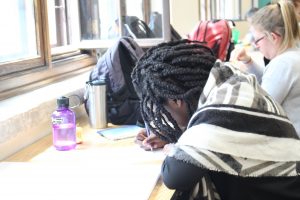Canadian School of Peacebuilding
2019 Courses
All courses can be taken for training or for undergraduate credit. In addition, courses marked with an asterisk (*) can also be taken for graduate credit and can be used towards CMU’s new MA in Peace and Collaborative Development (Click herefor more information on the MA-PCD). Each CSOP course runs for 5 days, Monday to Friday, 8:30 AM – 5:00 PM Participants may apply for only one course each week and may apply for one week or for two weeks.
Session I: June 10-14, 2019
 Indigenous Perspectives on Salvation, Repentance, Peace, and Justice*
Indigenous Perspectives on Salvation, Repentance, Peace, and Justice*
Instructor: Ray Aldred
BTS/PCTS-3895C and BTS/PCD-5700C
This course will examine theologies that have emerged from within the Indigenous community and which are rooted in Indigenous worldview, social engagement, and historical experience with Christian faith. Under the Canadian colonial enterprise, salvation for indigenous people was defined as becoming Western and civilized which meant repenting of indigenous identity, putting it off, and becoming Western, or enfranchised into Canadian society. The focus on Cree theology will provide opportunity to reinterpret conversion and repentance as turning to Christ by embracing a God-given indigenous identity as a true human being. This reinterpretation of repentance provides space for non-indigenous North Americans to embrace their own responsibility for reconciliation grounded in peace and justice. The format will include lecture, critical reading, case analysis, and class discussion.
Peace Skills Practice
Instructors: Natasha Mohammed
PCTS/BUSI-2190C
Throughout this course, participants will examine a variety of approaches to dealing with conflict in diverse locations such as: first party conflicts (responding to your own conflicts), third party conflicts (helping others in conflict) and learning to recognize the cultural elements of conflict resolution (moving beyond your own culture). Participants will practice the role of the peacebuilder in situations when gossip, venting, and advice-seeking is being experienced.
This course is offered in partnership with Resolution Skills Centre (RSC) and Mediation Services and counts as 5 days of credit towards an RSC certificate.
Alternative Approaches to Monitoring and Evaluation*
Instructor: James Magnus-Johnston and Ray Vander Zaag
IDS/PCTS/BUSI-3950C and PCD-5910C
Community-based initiatives in development, peacebuilding, and social innovation have questioned the appropriateness of mainstream monitoring and evaluation (M&E) approaches, which use logical frames and quantitation indicators to ensure accountability and assess impact. Participants will be introduced to a range of alternative approaches to M&E that emphasize relationships, complexity, learning and collaboration. How do you know when your organization or program is making a difference? How do you maintain focus on the right priorities? We will explore outcome mapping, social frameworks, ethnographic and story-based approaches, as well as developmental and utilization-focused evaluation tools in case study context. This course will encourage mutual learning among participants on people-focused M&E rather than the development of skills in any single approach.
Making Music, War and Peace*
Instructor: Svanibor Pettan
PCTS/MUSC/SOCI-3950C and PCD-5190C
This course will engage applied ethnomusicological research in regions having experienced armed violent conflict, examining what has been learned about music’s role in these contexts. Svanibor will utilize his context in south-east Europe and the music-making has been present during war- and peace-making in that region over the past 100 years. Detailed study will be made of two projects, focusing on Bosnian refugees in Norway and Romani (gypsy) musicians in Kosovo, and of the International Council for Traditional Music and its contribution to peace. Svanibor’s film, Kosovo Through the Eyes of Local Romani (Gypsy) Musicians, will be presented, and serve as a basis for discussion of a follow-up study of the ethnomusicology of conflict and violence and the potential for other contexts.
This course is well suited to students, community organizers, musicians and researchers interested in the experiences of applied ethnomusicology for issues such as conflict and underprivileged social status of individuals and groups and the betterment of the current conditions. Participants will be asked to use case studies to create their own projects and research assignments.
